Latest News
- 25.
Feb 2026WaterProof Webinar: Industrial-Urban Symbiosis: Business, Funding, and Practical Insights
25 March 2026, 13:00-14:30 CET, online
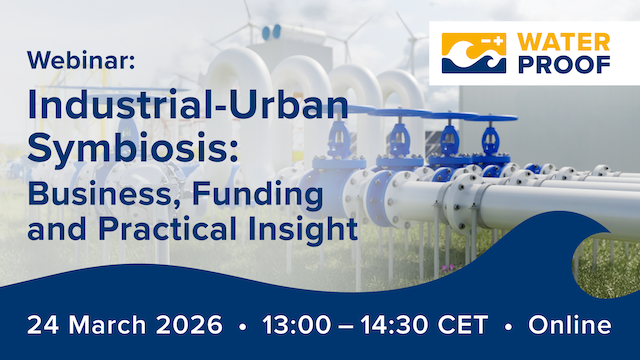
Industrial-Urban Symbiosis (I-US) enables new business opportunities though the collaboration of diverse stakeholders across various sectors. Hereby, this innovative approach facilitates the exchange of underutilised resources, e.g. by-products, residues, energy, water, capacities, and expertise, keeping materials productive longer. By repurposing outputs as inputs, I-US can minimise resource extraction, cut costs, and advance objectives of the EU Circular Economy Action Plan.
Key criteria of this value creation are aligned stakeholder interest and the exchange of perspectives. Businesses benefit from reduced raw material costs, supply chain resilience, lower disposal expenses, and new revenue opportunities. Meanwhile local authorities and regions can profit from healthier ecosystems, economic vitality, and new job opportunities. These complementary goals drive economic resilience and systemic change towards sustained resource loops, higher recycling rates and enhanced regional sustainability.
To turn theory into practice, the EU-funded WaterProof project hosts the webinar “Industrial-Urban Symbiosis: Business, Funding, and Practical Insights”. Join on 24 March 2026 from 13:00 to 14:30 CET for targeted strategies and practical insights that will equip industry professionals and practitioners with proven I-US skills.
The WaterProof Project and I-US Integration
WaterProof implements I-US by developing a cutting-edge CO2 conversion technology . Powered by renewable energy, this unique electrochemical process converts CO₂ captured from wastewater treatment and waste incineration into formic acid. It hereby turns emissions into a sustainable carbon feedstock replacing fossil resources. The generated formic acid will be tested in applications like fish leather tanning and consumer cleaning products as well as the formulation of Formic-derived Acidic Deep Eutectic Solvents (ADES). The project’s synergies perfectly illustrate I-US potentials: Urban CO₂ emissions supply chemical industries. Peroxide by-products treat wastewater contaminated with pesticides, antibiotics, and pharmaceuticals. Formic-derived Acidic Deep Eutectic Solvents (ADES) extract precious metals from ash and sludge, creating closed loop circular systems.The webinar will feature presentations from leading experts
- Alena Jahns/Mara Wagner (IZES): Introduction to the WaterProof project and Industrial Urban Symbiosis.
- James Woodcock (International Synergies Limited & H4C ECoP): Business cases and funding for I-US
- Hannes Utikal (Provadis School, Process4Sustainability at Industrial Park Höchst, Frankfurt): Practical example: Industrial Symbiosis collaboration at Höchst Industrial Park.
- Eric Schuler (Avantium): Embedding CCU/the volta technology in the I-US context
- 29.
Oct 2025Avantium at Weekend van de Wetenschap 2025
4+5 October 2025, Amsterdam, Science Park
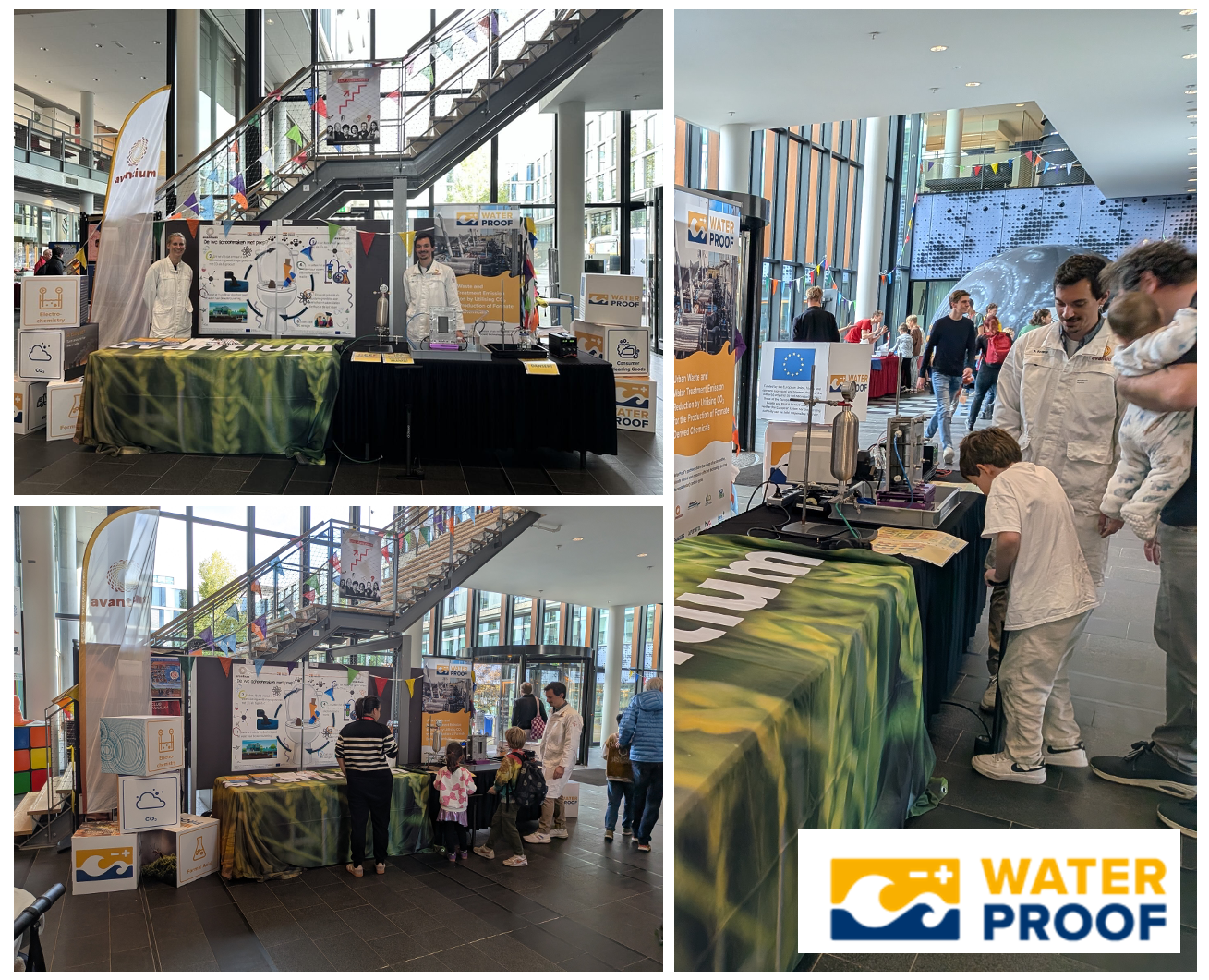
Would you know where your toilet water goes once you flush? At the science market at the University of Amsterdam WaterProof partner Avantium explained to a lot of curious kids where the water goes after you flush the toilet and how you can make cleaning products from CO₂. Scientists Brian Rawls showed some electrochemical setups that they could turn themselves on and off, while kids could explore what happens. This event surely informed the next generation and might have inspired a future electrochemist or two.
- 27.
Oct 2025Avantium Info-Day for young reseachers from University of Leiden
30 October 2025, Amsterdam
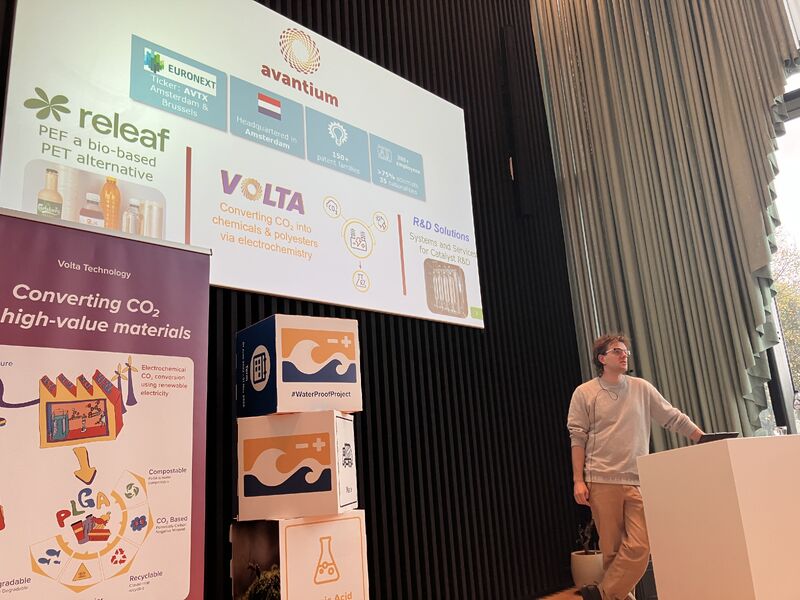
Knowledge share and implentation are key for a successful and sustainable future economy and the impactful tranfer of project results.
To inform young researchers, WaterProofProject partner Avantium welcomed students from Universiteit Leiden to Amsterdam Science Park. There, Eric Schuler shared Avantium’s vision for CO₂-based chemistry and gave a glimpse into future work environments in the field of electro-chemistry, while also showcasing achievements by the the HICCUPS and WaterProof project.Curious what these projects are working on? Take a look:
🔗 hiccups.eu
🔗 waterproof-project.eu - 06.
Oct 2025H4C ECOP & Demonstration Projects Joint Webinar – Showcasing outcomes, lessons, and collaboration opportunities from three European Demonstration Projects on Industrial Symbiosis
29 October 2025, 13:00-15:00 online Webinar
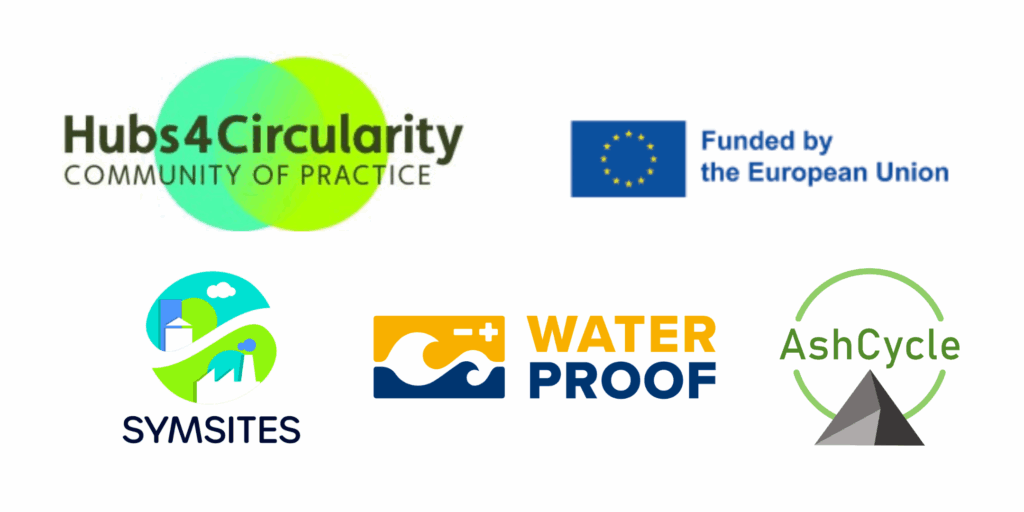
As part of ongoing efforts to foster collaboration and knowledge exchange, this webinar will bring together three Demonstration Projects.
The session will provide a platform to share experiences, highlight achievements, and openly discuss barriers and challenges encountered during implementation.Objectives
- Showcase progress and outcomes from the Demonstration Projects
- Exchange lessons learned, good practices, and challenges
- Strengthen connections among stakeholders and explore future collaboration opportunities
- Identify common barriers and discuss potential solutions
Who Should Attend
- Project teams and partners from the Demonstration Projects
- Stakeholders and policymakers engaged in Industrial Symbiosis (IS)
- Participants involved in H4C ECOP and RISERS initiatives
- Wider community of practice and interested participants
Expected Outcomes
- Greater visibility of project achievements
- Shared understanding of key challenges and possible solutions
- Strengthened collaboration across projects
- Clear next steps to build on webinar outcomes
Registration via EventBrite: https://www.eventbrite.co.uk/e/h4c-ecop-demonstration-projects-joint-webinar-tickets-1715170283489
- 03.
Sep 2025Transdisciplinary perspectives in the circular economy – WaterProof training workshop for students and early-stage researchers
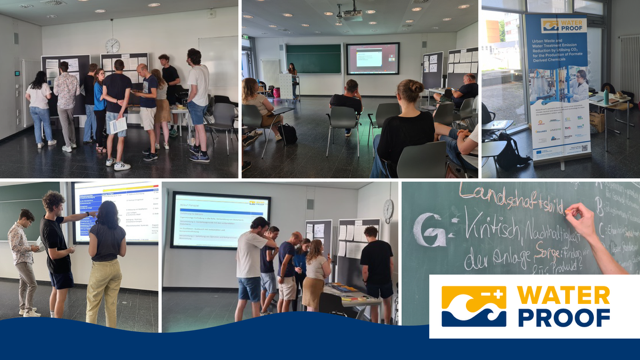
How can industry professionals, researchers and local communities work together to successfully close the carbon loop? On 17 June 2025, experts, students and future professionals from disciplines such as engineering, climate science and social research came together at the Saarland University to answer this question in an interdisciplinary workshop organized by the EU-funded WaterProof project. The event titled “Transdisciplinary Perspectives in the Circular Economy” aimed to bridge the gap between technological innovation, social acceptance and practical application. All of which are key factors for a successful implementation of Carbon Capture and Utilisation (CCU) technologies in local communities and the establishment of a truly sustainable, circular economy. The event even took participants to the fictitious village of “Tülzweiler”, where in a simulation game they had to deliberate a proposed CCU plant extension from a multistakeholder perspective.
Collaborative approach for successful sustainable transition
The WaterProof project aims at developing an electrochemical process that converts CO₂ emission captured from consumer waste incineration and wastewater treatment facilities into formic acid. This formic acid can then be used in the creation of green consumer products, such as cleaning detergents, the tanning of fish leather, and special solvents (ADES) used in the recovery of precious metals from industrial waste incineration ash. In addition to the technological dimension, WaterProof follows a transdisciplinary approach, emphasizing dialogue among scientists, industry professionals, and community stakeholders to ensure that technological advancements align with societal needs, the specific needs of local communities and environmental objectives.
This training workshop exemplified the project’s commitment to knowledge transfer and collaborative problem-solving. Bringing together 12 participants from diverse fields, the workshop fostered lively discussion on the challenges and opportunities in closing carbon cycles while addressing the priorities of different stakeholder perspectives. Participants quickly recognised that integrating expertise from multiple disciplines is essential to develop robust and widely accepted solutions and public acceptance for CCU technologies and CO2-derived products.
Key assessment methods and simulation game
The workshop opened with an inspiring presentation by Lucas Albers from the nova institute, who introduced the group to the method of Life Cycle Assessment (LCA) as well as Social-LCA, showcasing the importance of social risk management and the challenges of gethering data on qualitative variables, stakeholder perspectives but also global supply chains. This session emphasized the necessity of expanding the use of LCA-methodology to S-LCA, as well as the implementation of academic exercises into practical applications of technology development and product acceptance.
A highlight was a simulation game set in the fictitious village of “Tülzweiler”. Here, participants assumed the roles of local stakeholders deliberating a proposed CCU plant extension. Immersed in their adopted identities ranging from residents and business owners to environmental advocates and technology providers, the participants navigated and discussed concerns such as extensive land use, social and environmental fairness, stakeholder benefits, and environmental impact. This exercise displayed the intricate web of considerations that shape the acceptance and success of circular technologies in local communities.
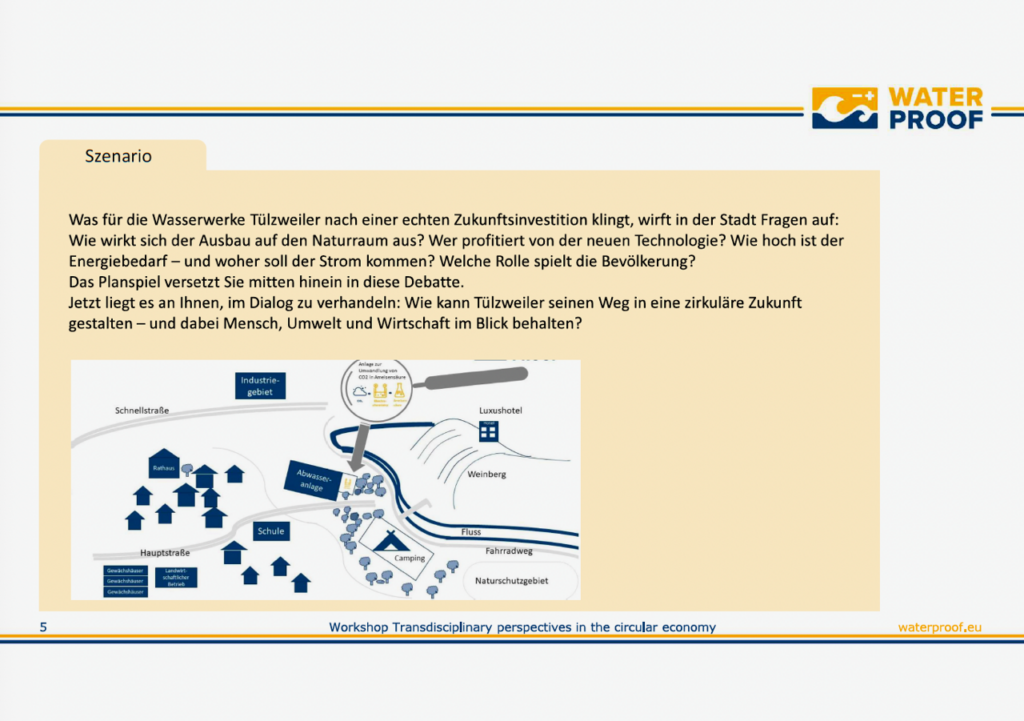
Workshop outcomes and impact
The workshop delivered several positive outcomes:
- Enhanced understanding: Participants gained hands-on insight into the complexity of implementing CCU technologies, benefiting from both technical discussions and role-play-based learning. All attendees left with raised awareness for transdisciplinary perspectives.
- Strengthened soft skills: The training fostered key competencies including communication, perspective-taking, conflict resolution and teamwork. All these skills vital for industry professionals and researchers driving technological change.
- Fostering new approaches: The simulation game provided an innovative educational model, equipping future professionals with the mindset to assess sustainability challenges from multiple vantage points in a playful and innovative way.
The participant feedback was overwhelmingly positive, with many expressing a desire for more time to delve deeper into such comprehensive solutions, a clear indication of the engagement and value the workshop offered.
Advancing circular solutions
By equipping the next generation of researchers and industry-professionals with both knowledge and social competencies, WaterProof is helping to pave the way for a truly circular, renewable carbon future, where technological innovation is based on inclusive dialogue among all stakeholders.
This workshop was organised as part of an interdisciplinary lecture series at Saarland University, in cooperation with IZES gGmbH.
- 17.
Jul 2025WaterProof at the 17th International Conference on Materials Chemistry (MC17), in Edinburgh, United Kingdom
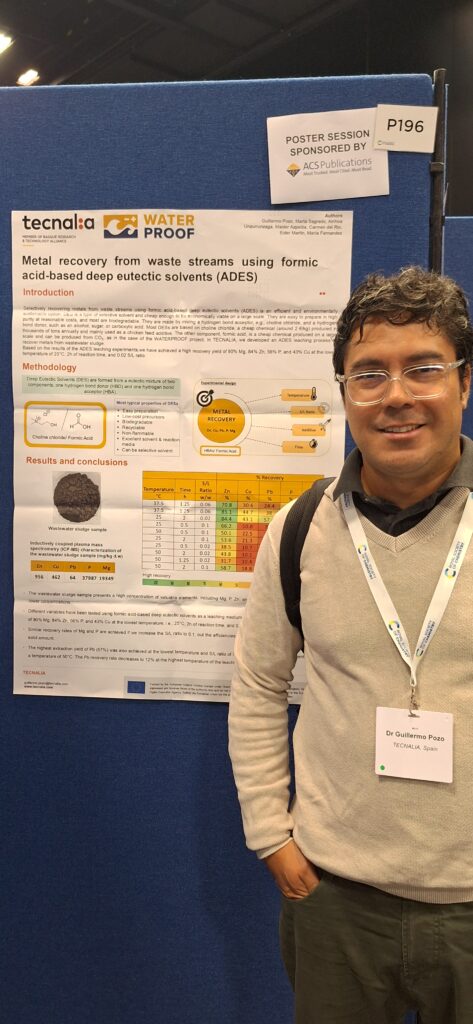
On July 7-10, 2025, Dr. Guillermo Pozo from TECNALIA presented the poster “Metal recovery from waste streams using formic acid-based deep eutectic solvents (ADES)” at the 17th International Conference on Materials Chemistry (MC17), in Edinburgh, United Kingdom.
TECNALIA is working on WP3 (Product Implementation and Value Chain Circularity) in the WaterProof project. TECNALIA’s task focuses on the use of formic acid products derived from recycled CO₂, their circularity within the value chain, and their validation in the synthesis of acidic deep eutectic solvents (ADES) for metal recovery from waste streams.
The MC17 conference, organized by the Royal Society of Chemistry in 2025, brought together leading materials researchers from around the world. Dr. Guillermo Pozo, from the WaterProof consortium, had the opportunity to network with representatives from both the academic and private sectors, helping to identify new stakeholders and enhancing the potential exploitation of TECNALIA’s WaterProof results in metal recovery from wastewater sludges and incineration ashes.
- 04.
Jun 2025Workshop for students and young researchers in Saarbrücken at 17 June 2025 (in German)
In this interactive workshop, students and young researchers from STEM or social sciences will be informed on the importance of interdisciplinary collaboration for sustainable innovation. The workshop is organised by IZES with support by nova-Institute. Students from inside and outside the Universität des Saarlands can register until 12th June 2025.
Content of the workshop:
- Introduction to environmental psychology and transdisciplinary processes in the circular economy using the example of the EU-project WaterProof
- Insight into the methodology of the Social Life Cycle Assessment (S-LCA) with an expert from nova-Institut GmbH
- Interactive simulation game focussing on a sustainable infrastructure project
- Exciting impulses, discussions and exchange with participants from other disciplines
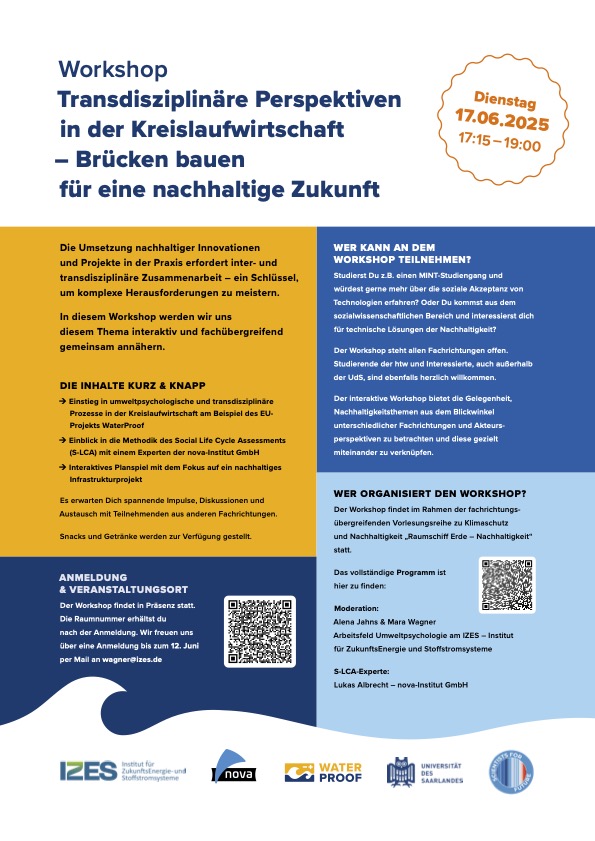
- 16.
Apr 2025Webinar: From Emissions to Innovation: CO₂-Derived Chemicals
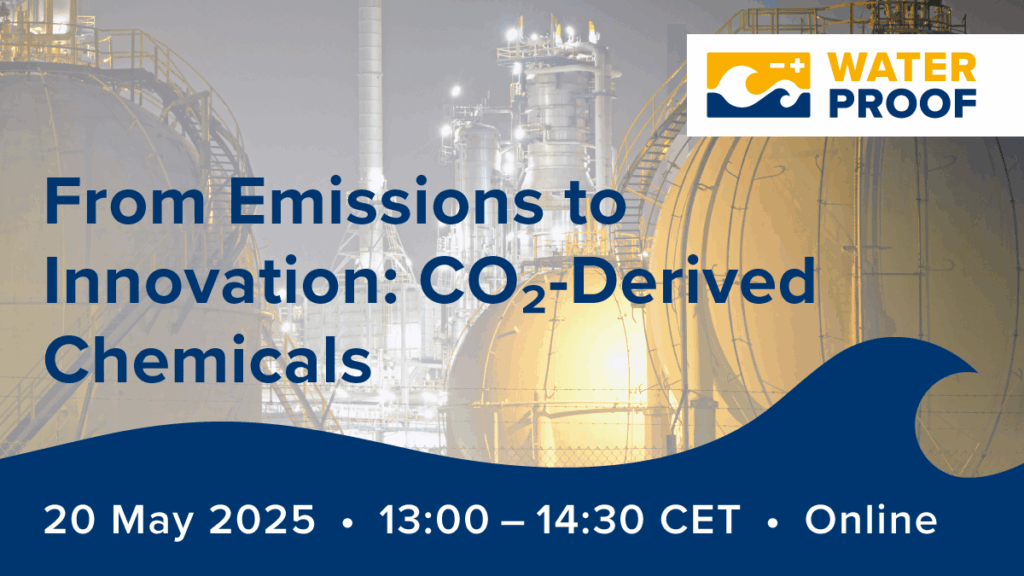
20 May 2025, 13:00-14:30 CET, online and free
Carbon dioxide (CO₂) is known as the main driver of climate change. Yet, CO₂ is increasingly recognised as a promising renewable feedstock for the production of valuable chemicals and fuels. By capturing CO₂ emissions from industrial point sources or directly from the air (direct air capture, DAC) and converting them into essential building blocks, it is possible to reduce reliance on fossil resources from below ground, lower greenhouse gas emissions, and help drive the transition to a circular, climate-neutral economy.
Recent advances and innovations in Carbon Capture and Utilisation (CCU) technologies are making it feasible to transform CO₂ into a wide range of products, ranging from base chemicals to advanced fuels. These innovations are not only closing the carbon loop of the chemical industry (defossilisation) but also enabling the integration of renewable energy and transport fuels (decarbonisation) into chemical processes, further reducing the environmental footprint of these vital industries.
The spectrum of CO₂-derived chemicals and fuels is rapidly expanding thanks to breakthroughs in electrochemical, catalytic, and biotechnological processes. Some of the most promising examples include:
Chemicals such as Methanol, Formic acid, Ethanol, Acetic acid, Urea, Polycarbonates and cyclic carbonates, Organic acids (e.g., carboxylic acids, salicylic acid, malonic acid), Esters and lactones, Aromatics and olefins, Glycerol carbonate.
Fuels such as Synthetic gasoline, diesel, and kerosene, Methane, and E-fuels.
These examples illustrate the broad potential of CO₂ as a renewable carbon source for the chemical and materials industry and the energy sector, supporting the shift towards sustainability and circularity.To explore these exciting developments, the EU-funded research project WaterProof is hosting a webinar titled “From Emissions to Innovation: CO₂-Derived Chemicals” on May 20th, 2025, from 13:00 to 14:30 CET.
The event will bring together leading experts including- Pia Skoczinski (nova-Institute) – Renewable Chemicals from CO₂ – An Overview
- Francesca di Bartolomeo (SINTEF, coordinator PyroCO2 Project) – Pioneering Sustainable CO₂ Conversion to C3 Chemicals and High-Value Lipids for Feed and Food Applications
- Albert Guisasola (Autonomous University of Barcelona (UAB), Vivaldi Project) – Innovative bio-based chains for CO₂ valorisation as added-value organic acids
- Eric Schuler (Avantium, WaterProof Project) – Innovative Chemicals and Sustainable Polymer Solutions from CO₂ and renewable electricity
Attendees will gain insights into the latest CCU technologies, market trends, and applications that are driving the shift towards a circular carbon economy.
Discover how CO₂ is being utilised as a valuable resource and learn about the innovations shaping the future of sustainable chemicals. Register now to be part of this dynamic conversation and help unlock the full potential of CO₂-derived chemicals. - 19.
Feb 2025Webinar on Unlocking CCU Potential Through Electrochemistry
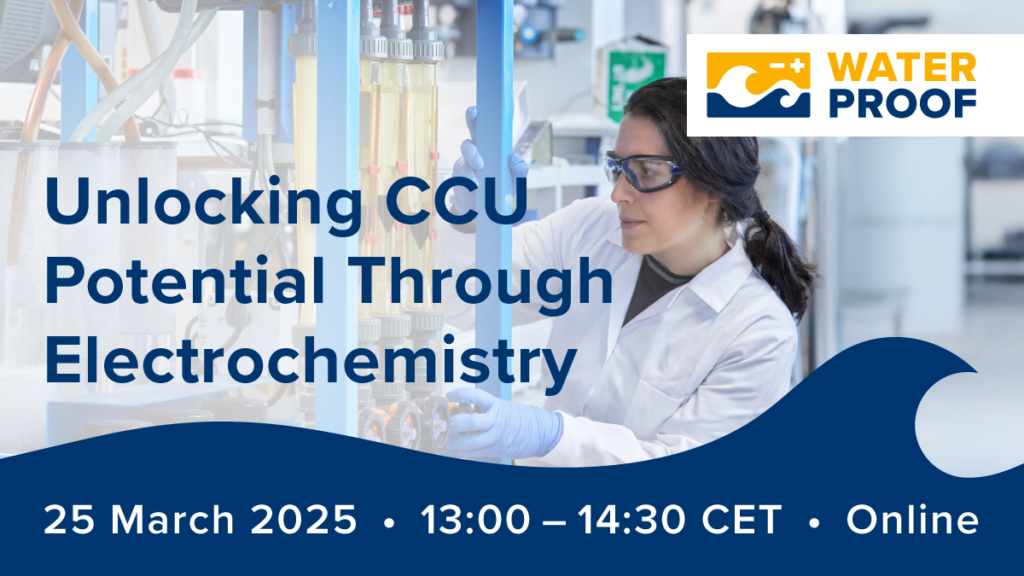
25 March 2025, 13:00-14:30 CET, online and free
Electrochemistry is rapidly emerging as a key technology for Carbon Capture and Utilisation (CCU), offering a sustainable route to transform CO₂ emissions into a valuable resource for the chemical and materials industry. Many valuable chemicals or fuels can be produced from electrochemistry: CO, methane, methanol, formic acid, ethane, ethanol, ethylene, oxalic acid and other hydrocarbons. The development of electrocatalytic CO₂ reduction is progressing, with much interest in commodity chemicals such as ethylene to break down barriers to market entry. This innovative approach promises not only to mitigate climate change but also to reduce industries’ dependence on fossil resources, driving a significant shift towards global sustainability goals.
The WaterProof project invites researchers and industry stakeholders to an insightful webinar. This event will showcase the latest advancements in electrochemical CO₂ conversion and their potential to transform entire industries by making chemical production more sustainable.
The webinar will feature presentations from leading experts
- Patrick Löb (Fraunhofer IMM): Flow reactors for the electrochemical CO2 reduction to formate / formic acid and beyond
- Brian Rawls (Avantium/Volta): Exploration of electrochemical production of CO₂-based polyesters and chemicals, and introduction of the WaterProof project’s technology for electrochemical CO₂ conversion into formic acid.
- Danny Hellebusch (Twelve): VP CO₂ Electrolyzer – Demonstration of Twelve’s revolutionary “industrial photosynthesis” technology, which Twelve has successfully scaled up to transform CO₂ into products ranging from sustainable aviation fuel to car components.
Agenda
13:00-14:10 Patrick Löb (Fraunhofer IMM): Flow reactors for the electrochemical CO₂ reduction to formate / formic acid and beyond
13:20-13:40 Brian Rawls (Avantium/Volta): Exploration of electrochemical production of CO₂-based polyesters and chemicals, and introduction of the WaterProof project’s technology for electrochemical CO₂ conversion into formic acid.
13:40-14:00 Danny Hellebusch (Twelve): Introducing Twelve and showcasing the potential of electrochemical CO₂ conversion by showcasing products we’ve created from jet fuel to car parts
14:00-14:30 Discussion and Q&A
- 14.
Nov 2024NOVA presented WaterProof at the 2. Circular Carbon Economy Summit in Vienna, Austria (12 November 2024)
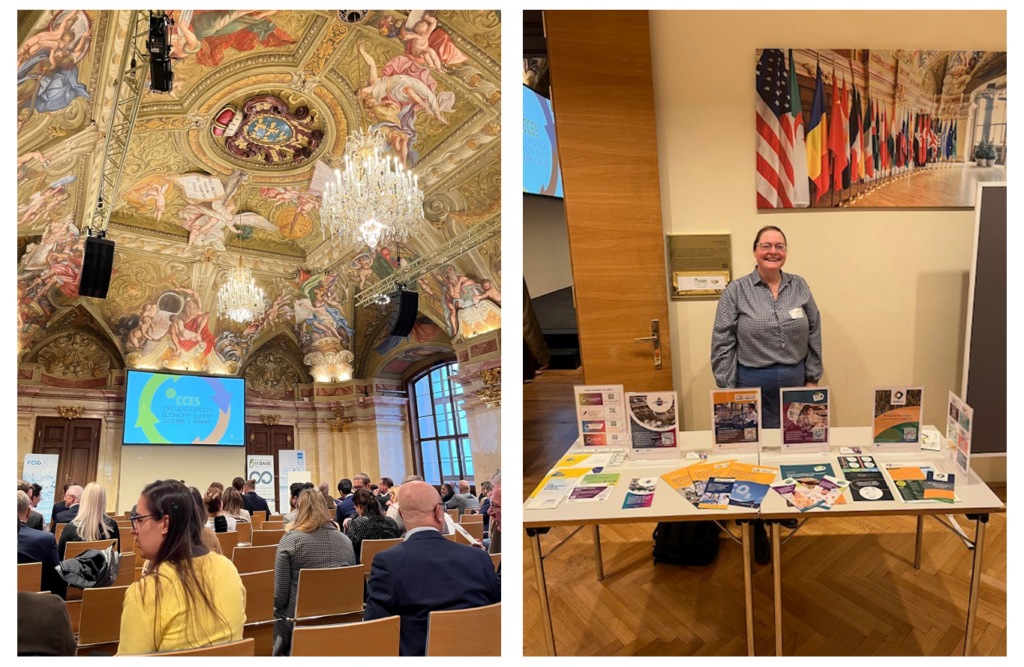
Anke Schwarzenberger from NOVA presented a shared booth with information material, factsheets and flyers of the project WaterProof to an audience of 260 registered participants interested in CO₂-derived and other renewable materials, technologies and innovations.
The summit with the subtitle “Future-orientated management through efficient bioeconomy and circular economy” took place at the beautiful “Palais Niederösterreich” and was hosted by BioBASE GmbH.
